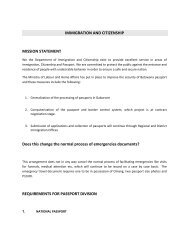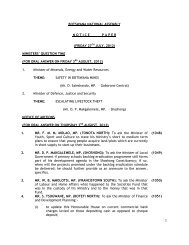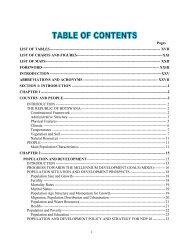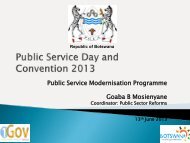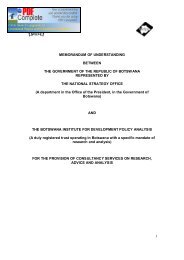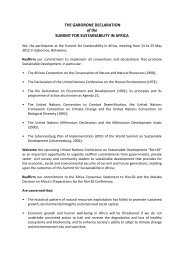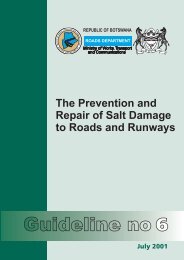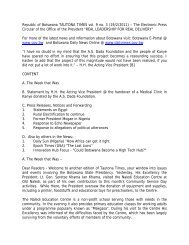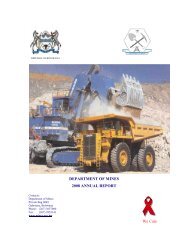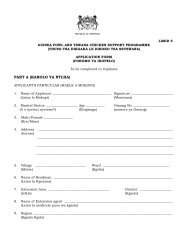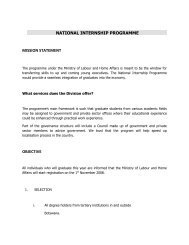National Nutrition and HIV/AIDS Guidelines for Service Providers of ...
National Nutrition and HIV/AIDS Guidelines for Service Providers of ...
National Nutrition and HIV/AIDS Guidelines for Service Providers of ...
Create successful ePaper yourself
Turn your PDF publications into a flip-book with our unique Google optimized e-Paper software.
neglect children, have mental health problems, or are poor.<br />
5. 4 Management <strong>of</strong> Common <strong>Nutrition</strong>-Related Conditions Intervention <strong>for</strong> Infants <strong>and</strong> children<br />
with <strong>HIV</strong>/<strong>AIDS</strong><br />
Please refer to Table 5.1 <strong>for</strong> the management <strong>of</strong> the common nutrition related conditions in infants<br />
<strong>and</strong> children with <strong>HIV</strong>/<strong>AIDS</strong>. These suggestions were provided because they were shown to work.<br />
However, children who show no improvement despite careful implementation <strong>of</strong> the recommended<br />
interventions should be referred to a dietitian <strong>for</strong> a thorough nutrition assessment as there may be<br />
other underlying conditions.<br />
Table 5.1: Suggested <strong>Nutrition</strong>al Intervention <strong>for</strong> Infants <strong>and</strong> Children with <strong>HIV</strong>/<strong>AIDS</strong><br />
SYMPTOMS<br />
Normal/mild symptoms; fever,<br />
infection<br />
INTERVENTION<br />
· Well balanced diet, nutrient dense with snacks<br />
· In the case <strong>of</strong> fever encourage fluids<br />
Poor weight gain/growth, poor<br />
appetite<br />
· High calorie, high protein, nutrient dense diet.<br />
· <strong>Nutrition</strong>al supplementation under close dietetic monitoring<br />
6<br />
Diarrhoea /mal-absorption<br />
· Give oral rehydration solution <strong>and</strong> feed s<strong>of</strong>t foods as soon as food<br />
can be tolerated. Ideally, children should be fed within 4 hours<br />
<strong>of</strong> re-hydration.<br />
· Encourage fluids <strong>for</strong> dehydration<br />
· Avoid concentrated <strong>for</strong>mulas<br />
· Avoid excessive fruit juices <strong>and</strong> foods with sorbitol<br />
· Restrict lactose if necessary till diarrhoea resolves<br />
· Avoid intake <strong>of</strong> insoluble fiber; soluble fiber maybe helpful<br />
· Avoid high fat foods if steatorrhoea is suspected<br />
Nausea, vomiting<br />
· Eat cold foods <strong>and</strong> beverages<br />
· Eat dry foods, such as crackers or toast<br />
· Small frequent meals<br />
· Low fat, bl<strong>and</strong>, non spicy foods<br />
· Avoid strong smelling foods<br />
· Avoid carbonated drinks<br />
Oral/oesophageal/gastric<br />
discom<strong>for</strong>t <strong>and</strong> pain<br />
· Smooth, s<strong>of</strong>t foods<br />
· Cold, non-spicy foods<br />
· Cut food into small pieces<br />
· Milkshakes, ice creams<br />
· Drink through straw<br />
· Small, frequent meals<br />
· To aid swallowing, use mild sauces <strong>and</strong> gravies on foods<br />
Developmental delay<br />
· Feeding/swallowing evaluation by trained individuals<br />
· Texture modifications or feeding by parent or caretaker<br />
6<br />
For more detailed classification <strong>of</strong> diarrhoea <strong>and</strong> recommend feeding consult the IMCI guidelines, page 11.<br />
28



